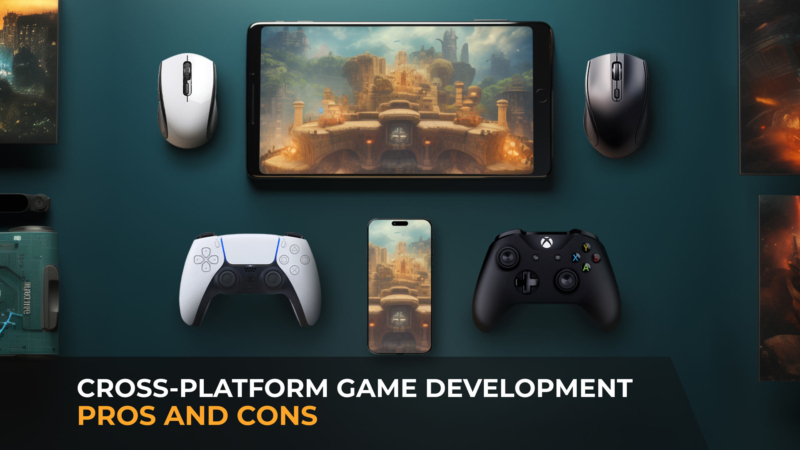Cross-platform play, the ability for gamers on different platforms to play together online, has become a defining feature of the modern gaming landscape. While it might seem like a recent innovation, its roots go back further than most people think.
Where Did Cross-Platform Gaming Come From?
The concept of cross-play emerged in the early 2000s, with some Dreamcast titles allowing players to team up online regardless of their region or whether they were playing on the console or PC. However, these early attempts were limited due to the closed nature of most consoles at the time. PCs, with their inherently open architecture, were the primary platform for cross-play experiences.
The landscape began to change, however, with the introduction of the seventh-generation consoles (PlayStation 3, Xbox 360, Wii), which were designed with special game mechanics and robust online capabilities in mind. This game dev shift paved the way for more widespread cross-play adoption.
The Switch to Cross-Platform Development
The true turning point for cross-play came in the mid-2010s with the meteoric rise of games like Minecraft and Fortnite. These titles, with their focus on online social interaction, demonstrated the immense potential of cross-play in expanding player bases.
Today, cross-platform play is no longer a novelty. Publishers, even those who traditionally only went after narrow niches, like 2D and 3D mobile game development and specific mobile platforms, increasingly embrace cross-play.
The best game development engines, like Unity and Unreal, now offer increasingly robust cross-platform development tools, making it easier and more cost-effective for publishers to reach wider audiences. This massively benefits creators by increasing their potential player base.

Benefits of Cross-Platform Game Development
Financial Efficiency
- Reduced development costs and simultaneous launch. Developing a single codebase for a cross-platform game saves significant costs in programming, art, and design by eliminating the need for separate versions. This also allows for a consolidated launch strategy, reaching a wider audience at once and maximizing return on investment.
- Simplified future expansion. Adding new platforms becomes easier and cheaper with a cross-platform development approach (especially since all the best game engines are now competing to offer the best cross-platform development kit.) The core code is already built, so the focus shifts to optimizing visuals and controls for each new platform.
Reduced Maintenance Costs
- Streamlined updates. Updating a cross-platform game requires patching a single codebase, which significantly reduces the development and testing resources compared to maintaining separate title versions.
- Unified player base. In any cross-platform development project, the key goal is to achieve seamless gameplay across all platforms, eliminating the need for separate servers and matchmaking systems. This unified approach benefits both players (consistent experience, easy matchmaking) and publishers (simplified maintenance).
Increased Audience Reach
- Larger player base. By reaching players across multiple platforms, publishers can tap into a larger pool of potential customers, boosting sales and in-game revenue.
- Enhanced social interaction. The bigger, more vibrant, and inclusive community helps build a stronger brand image for the publisher and encourages long-term player engagement.
- Easy market management. Since a single codebase simplifies the management of different market versions of the game, the developers only need to focus on content localization (translation) instead of adapting core gameplay mechanics for each region.
Better Matchmaking and Leaderboards
Cross-play brings several benefits for multiplayer games, particularly in terms of matchmaking and leaderboards:
- Increased player pool. It expands the pool of potential players, leading to faster matchmaking times and more balanced competition.
- Centralized data handling. With a single codebase and unified servers, player data (like statistics and achievements) becomes centralized. This eases the creation and management of leaderboards, offering a more accurate and unified view of player performance across all platforms.
More Effectual Marketing Pushes
Unlike native development, cross-platform engineering also streamlines marketing efforts:
- Centralized marketing. Developers can focus on a single, unified marketing campaign that targets a broader audience across all platforms. This enables the publishers to avoid creating campaigns for each separate game platform, reducing costs and maximizing marketing effectiveness.
In conclusion, there are clear incentives for publishers to create a cross-platform game. The most significant advantages are potential cost savings, a streamlined development cycle, and the ability to reach a wider audience and build a more engaged community around the game.
The Best Cross-Platform Game Engine: Which Engine Allows You to Develop a PC, Console, or Mobile Game That Can Be Equally as Effective on Any Platform?
Unity Game Engine Cross-Platform Strengths
- Broad platform support. Unity is an extremely popular game engine that boasts impressive support for a wide range of platforms.
- Asset store advantage. Unity is a game development platform with a genuinely large asset store. It offers a wealth of models, textures, and code to enable cross-platform compatibility.
Unreal Engine’s Cross-Platform Power
- Engine-level optimization. While Unreal development requires more experience, the engine also provides many tools and features specifically designed to optimize games for cross-platform play.
- Scalability for different needs. While it can be harder to develop a cross-platform game with Unreal, it allows us to scale graphics and features relatively easily. This means you can launch a visually stunning experience for consoles and PCs and a more optimized version for mobile, be it additional Android or iOS game app development, to get more traction on Google Play, App Store, etc.
- Versatility. While traditionally known for its PC and console prowess, Unreal Engine has made significant strides in mobile development, too. With continued improvements in this sphere, it’s becoming an increasingly flexible engine — a perfect option for creating high-quality console, PC, mobile, or cross-platform games.

Challenges Companies May Face During Cross-Platform Game Development
Notwithstanding the numerous advantages of cross-platform development, it’s not without its challenges. Here’s a closer look at some potential drawbacks game publishers must always take into account:
Platform-Specific Nuances
- Non-native experience. Optimizing a game for multiple platforms can sometimes lead to a homogenized experience that doesn’t fully utilize the strengths of any specific platform. Controls, visuals, and sound design might feel like a compromise between different systems, lacking the polish of a native title.
- Limited feature integration. Even though game engines strive to provide all-encompassing cross-platform capabilities, unique features of individual platforms (like motion controls on the Nintendo Switch or touchscreen functionalities on mobile devices) might be difficult or impossible to fully integrate into a cross-platform game. Publishers may need to choose between sacrificing these features or creating a less streamlined experience with platform-specific controls.
Balancing the Playing Field
- Hardware disparity. Significant differences in processing power, graphics capabilities, and input methods between platforms (PC vs. consoles vs. mobile) can create balancing issues in cross-play. Players on stronger platforms might have an inherent advantage over those on weaker systems, leading to frustration.
These challenges can be mitigated with careful design and advanced game development strategies. For a truly optimized user experience across platforms, developers can leverage platform-specific control schemes and graphical settings. However, achieving this balance between customization and core gameplay fidelity necessitates extensive expertise in custom game development for various platforms.
By researching these potential drawbacks and implementing creative solutions, publishers can capitalize on the many benefits of cross-platform development while ensuring a high-quality gaming experience for all players.
When Should a Publisher Build a Cross-Platform Title, and When Is This Type of Game Development the Most Cost-Effective?
While cross-platform development offers a wealth of advantages, it’s not a one-size-fits-all solution. Here’s a breakdown of situations where cross-platform development shines for publishers:
Genre and Target Audience
- Genre focus. Games with a strong emphasis on accessibility, strategy, simulation, or casual experiences often benefit greatly from a wider player base.
- Broad audience appeal. Titles with broad appeal that target a wide demographic are ideal candidates for cross-platform development. Reaching players on consoles, PCs, and mobile devices expands the potential audience and increases the likelihood of commercial success.
Business Model and Monetization
- Freemium model. For games with a freemium monetization model (free to play with optional in-app purchases), cross-platform development allows for a larger user base to engage with microtransactions and in-game purchases, potentially leading to higher overall revenue.
- Focus on online engagement. Games that heavily rely on online features like multiplayer battles, competitive leaderboards, or social interaction benefit significantly from cross-play. A larger player pool leads to a bigger online community and increases player engagement.
Development Constraints and Time-to-Market
- Limited budget and resources. Publishers with smaller budgets can start using cross-platform development approaches to create a single title that reaches multiple platforms, maximizing their return on investment.
- Faster all-around time-to-market. In a cross-platform game development project, the time it takes to bring a game to market on various platforms can be shortened as a single codebase can be adapted for different platforms more quickly than developing separate versions.
However, cross-platform development might not be the best choice for all games. Consider these factors:
- Particular features. Titles that hinge on platform-specific game features (like motion controls or touchscreen mechanics) might be better suited as platform exclusives.
- Technical challenges. Games with very demanding graphics or complex mechanics might be difficult to optimize for weaker platforms within a cross-platform approach.
By carefully evaluating these factors in the game development process, publishers can make informed decisions about when cross-platform development is the ideal strategy to maximize their reach, revenue, and player engagement.
Why Partner with Vendors That Provide Custom and Cross-Platform Game Development Services?
Achieving cross-platform success requires significant expertise. While the perks are substantial, ranging from reaching a broader audience to enhancing development efficiency, the technical challenges can be formidable. Therefore, partnering with seasoned cross-platform game developers is often the best strategy. These professionals deeply understand the complexities of custom game development across various platforms and can ensure seamless performance optimization for each one.
Stepico has been a reliable guide to many publishers on the cross-platform odyssey. We provide a full range of services, from custom game development to Android and iOS game app development. Our extensive experience navigating the ever-evolving gaming landscape ensures we can expertly guide you. Through close collaboration, we’ll identify the ideal platforms for your game and meticulously optimize it for peak performance on each, from high-end PCs to budget phones. We don’t just optimize, we craft exceptional design. Your game will feel native to each platform while maintaining a cohesive cross-platform experience. And if you need to extend your reach within an existing native development project, our proven game porting services can help you, too. The result? An innovative masterpiece that transcends the limitations of any single platform, capable of captivating a global audience. Are you ready to unlock the full potential of your groundbreaking cross-platform game concept? Contact us today, and let’s turn your vision into reality.




